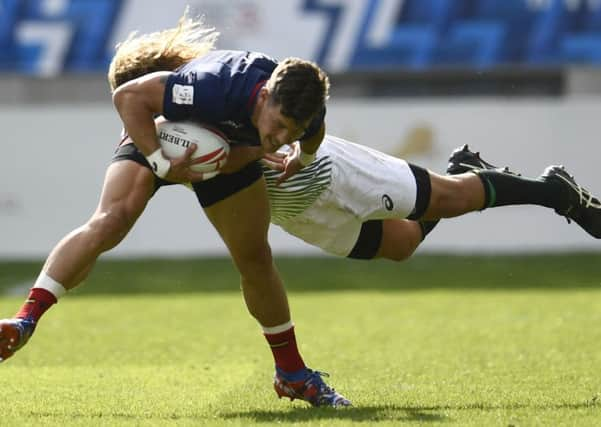Scotland finish as runners-up in World Sevens final in Paris


The “Blitzboks” have dominated the final and this season’s Sevens series. They have appeared in eight of the nine finals to date this season and they won five of them including Paris. Even before winning this final they had enough points in the bag to ensure that they took the series title for the season. Scotland are currently sitting seventh in the ladder.
The Boks won the final comfortably enough by three tries to one, the Scotland score coming from captain Scott Wight. Coincidentally it was South Africa that Scotland beat when they recorded their only tournament win in London last season, coming from behind to score two quickfire tries in the final 75 seconds, but there was no repeat of those heroics this time.
Advertisement
Hide AdAdvertisement
Hide AdThe highly physical South Africans dominated possession, the Scots missing too many tackles and making uncharacteristic unforced errors, two lineout throws going astray.
The Boks scored the first try after two minutes and the second with the clock in the red numbers. Jamie Farndale enjoyed one good gallop for the Scots but found himself isolated and turned over, which led directly to South Africa’s second try.
The Scots saw a little more of the ball after the break and they got themselves on the scoreboard when James Fleming and Glen Bryce combined up the right flank to send Wight over the line. Dougie Fife came off the bench but was unable repeat his try-scoring exploits at Twickenham last year.
That was as good as it got for the Scots. George Horne showed unbelievable pace but poor judgement in making a late tackle on Boks speedster Rosko Specman, which earned the Scottish half-back a yellow card. The Boks scored anyway and finished 15-5 winners.
“Overall I was really really pleased with the performance throughout the weekend,” said coach Callum McRae after the final. “Our attack was good the way we build the phases and we were dogged in defence keeping teams out for long periods but the final itself was disappointing.
“We misfired at the set peice and handed possession back to them on three occasions I think which obviously starts to add up.”
Was it the enormity of the occasion that got to the players?
“No, I don’t think so,” McRae argued. “We have four fully-capped internationals in the squad and our core players have heaps of experience of big games. It was just a lack of concentration that hurt us. We were taking good options but there were too many technical errors.”
Advertisement
Hide AdAdvertisement
Hide AdOddly enough, the Scots had already beaten the Boks in Paris, on the opening day after being drawn in the same pool. After that opening shock win in the pool stage, Scotland then went on to beat the much-improved Canadian Sevens team and Japan, progressing to the cup quarter-finals as top seeds and they remained unbeaten until the final.
On Sunday, McRae’s team played against Fiji first up and the Scots produced arguably the performance of the weekend in crushing the Olympic gold medallists by an eye-catching 24-0; a result that must have pleased Joe Nayacavou, the Scots very own Fijian recruit.
That result earned a semi-final place against England and the Scots edged that match despite a hat-trick of tries by England winger Dan Norton. The final beckoned but the 2016-17 series champions had too much pace and power and were deserving winners.
McRae has one last chance for s second victory next weekend in London before the Scotland Sevens coach moves on to become defence coach at Edinburgh Rugby. But he insisted that next weekend is not about him but rather about the “diligent and hard-working group of players”.
Whatever happens in London, McRae has set high standards for his successor John Dalziel to follow.